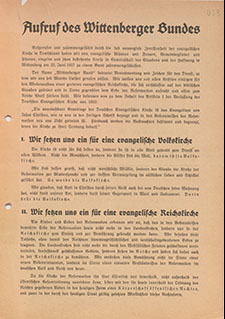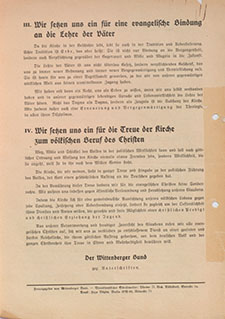The Wittenberg League
Those pastors and congregational members who were unaffiliated with either the Confessing Church or the German Christians were referred to as the neutral “center” in church circles. They accused the Confessing Church of being ossified in religious dogmatism and the German Christians of politicizing and secularizing the church.
The “center” constituted a substantial share of German Protestantism and was therefore an important ecclesio-political factor. The absence of common theological convictions and ecclesio-political aims made it difficult to unite in a bloc capable of action.
One of the most notable of the few attempts to form an organized “center party” in the church between the Confessing Church and the German Christians was the “Wittenberg League” founded on June 23, 1937.
The appeal for the league’s establishment stated that Protestant men and women, congregational members and pastors had joined together in order to bring about the reestablishment of a united Protestant Reich Church in view of the Protestant church’s inner strife, which is firmly based on the biblical faith and is upright and receptive to Adolf Hitler’s Reich in fidelity to the legacy of the Reformation.
Although the Wittenberg League did not succeed in gathering pastors and church laity in all of the regional churches, its leading members actively pursued a reorganization of the German Evangelical Church and supported Reich Minister of Church Affairs Hanns Kerrl’s plans to create a unified Reich Church controlled by the state, which would embrace every faction of German Protestantism.
When Kerrl’s attempt to reorganize the German Evangelical Church in 1939 on the basis of the “Godesberg Declaration” failed, the Wittenberg League lost all national significance and remained active only in a few regional churches.
The Confessing Church observed the neutral “center’s” activities with suspicion and concern. Theophil Wurm, Bishop of the Württemberg Regional Church, realized in April of 1937 that the “center’s” actions were capable of weakening the Confessing Church’s entire position. This concern was all the more justified when the Reich Minister of Church Affairs heavily relied on the “center” when implementing his church policy.
The Confessing Church counted the Wittenberg League – largely correctly – among the moderate German Christians. It accused its members of complacency and an aversion to decision making.
Source / title
- ©Evangelisches Zentralarchiv in Berlin, Bestand 1, No. 1271, Fol. 88.


